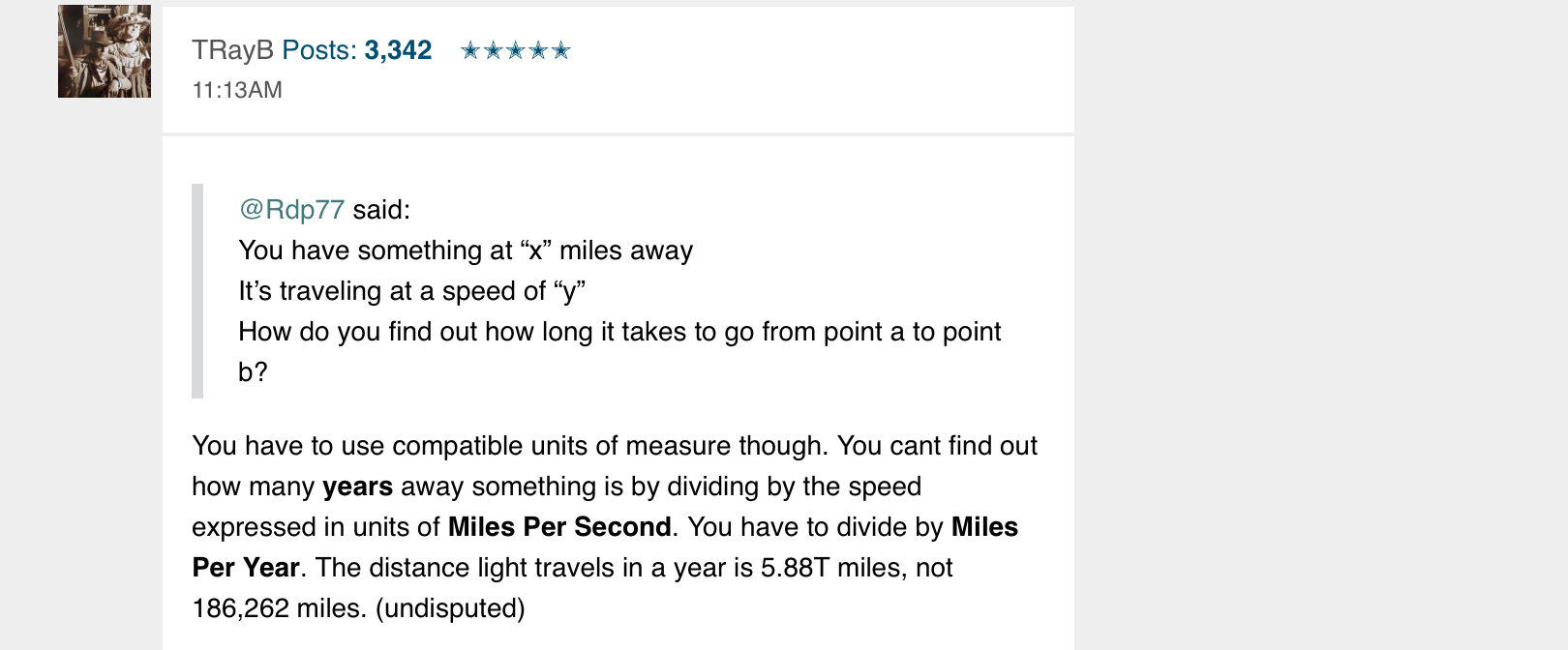Kinda cool
Comments
-
@TRayB said:
Interesting, but if Betelgeuse is 640 light years away, then it takes light from it 640 years to reach Earth, I think. I'm not sure where the 600 million is coming from?How many miles are in a light-year? 6 trillion. Miles in 640 light-years? 3,840 trillion. Divide that by the speed of light and you get 600 million years.
Edit: I didn't actually do the math, but that's how it'd work.
"I could've had a Mi Querida!" Nick Bardis0 -
@Rdp77 said:
Light travels at 670,616,629 mph. So by your reasoning if you shine a flashlight in the dark and I see it…you did it 670,616,629 years ago.That's not what I suggested at all. In fact, it's 180 degrees opposed to what I said.
I did it the length of time ago that it takes light to travel the distance between us at a speed of 670 million mph.
Again, if there is a light source in space 640 light years away, it takes light 640 years to reach Earth, so what we see on Earth today happened 640 years ago. It has nothing to do with years being equal to mph.
1 -
@peter4jc said:
@TRayB said:
Interesting, but if Betelgeuse is 640 light years away, then it takes light from it 640 years to reach Earth, I think. I'm not sure where the 600 million is coming from?How many miles are in a light-year? 6 trillion. Miles in 640 light-years? 3,840 trillion. Divide that by the speed of light and you get 600 million years.
Edit: I didn't actually do the math, but that's how it'd work.
I agree with the approximate miles in a light year, and the approximate total miles between Betelgeuse and Earth, but why would you divide by the speed of light? 640 light years is the distance light travels in 640 years. What we see from Betelgeuse today happened 640 years ago.
0 -
That’s Professor Rusty to the rest of you non scholar types.
 4
4 -
You have something at “x” miles away
It’s traveling at a speed of “y”
How do you find out how long it takes to go from point a to point b?If it don’t bother me, it don’t bother me. Just leave me alone.
0 -
@Rdp77 said:
You have something at “x” miles away
It’s traveling at a speed of “y”
How do you find out how long it takes to go from point a to point b?Measure it and that’s your answer. 😜
1 -
too hard, just ask the computer to figure it out for you.
2 -
@Rdp77 said:
You have something at “x” miles away
It’s traveling at a speed of “y”
How do you find out how long it takes to go from point a to point b?You have to use compatible units of measure though. You cant find out how many years away something is by dividing by the speed expressed in units of Miles Per Second. You have to divide by Miles Per Year. The distance light travels in a year is 5.88T miles, not 186,262 miles. (undisputed)
Let's run through this.
Betelgeuse (B) is 640 light years away from Earth (E). (undisputed)
640 x 365.25 days x 24 hours x 60 minutes x 60 seconds = 3,761,900,000,000,000 (Peter's 3,800 Trillion miles, undisputed)
3,761,900,000,000,000 miles divided by 186,262 Miles Per Second = @ 20 trillion seconds. 20 trillion seconds = 633,000 years. This is not the correct answer for how many years ago something happened in space, because it wasn't divide by the correct unit of time. Like I said, you have to divide the distance using compatible units, as follows:
3,761,900,000,000,000 miles divided by 5,873,958,432,000 Miles Per Year = 640.44 Years. It takes 640.44 Years for light to travel between Betelgeuse and Earth. That is why B is 640 light years away from E.
1 -
@silvermouse said:
too hard, just ask the computer to figure it out for you.My Disagree.
 2
2 -
Matter of time….Boveda humidor.
https://store.bovedainc.com/products/boveda-humidor?_gl=1*1e3jqwr*_gcl_au*NDI0NjI4MTU0LjE3NTQ4Mzk3MTI.1 -
Todd, this was my question:
You have something at “x” miles away
It’s traveling at a speed of “y”
How do you find out how long it takes to go from point a to point b?I don’t get the response.

At what point did I not use compatible units of measure considering I never mentioned a unit of measure? I’m not trying to be “right” and I’m not trying to say you’re “ wrong”. I asked a legitimate question. Stay out of the political thread, people can discuss something without having to be right or wrong.
If it don’t bother me, it don’t bother me. Just leave me alone.
0 -
@TRayB said:
@silvermouse said:
too hard, just ask the computer to figure it out for you.My Disagree.

I was being sarcastic, sorry.
1 -
This has been fun. I went back to the article I copied that quote from, and it now reads, "If this is accurate, Betelgeuse exploded 640 years ago -- the show is just now nearing earth... It's taken that long for the light to get here!" I don't know who changed it, or when or why, but there you have it.
So, that means we're good to move on to some other brain-twister.
"I could've had a Mi Querida!" Nick Bardis3 -
@silvermouse said:
@TRayB said:
@silvermouse said:
too hard, just ask the computer to figure it out for you.My Disagree.

I was being sarcastic, sorry.
No need to be sorry, Edward. I understood you.
0 -
@Rdp77 said:
Todd, this was my question:
You have something at “x” miles away
It’s traveling at a speed of “y”
How do you find out how long it takes to go from point a to point b?I don’t get the response.

At what point did I not use compatible units of measure considering I never mentioned a unit of measure? I’m not trying to be “right” and I’m not trying to say you’re “ wrong”. I asked a legitimate question. Stay out of the political thread, people can discuss something without having to be right or wrong.
Without going back through it all, I don't know that you used incompatible units of measure. I was using the term "You" as a generic term, as you were in what you just quoted "You have something at "x" miles away". However, I discovered that Peter used incompatible units (or the article he referenced used incompatible units) to come up with 600 million years ago, because the math was just wrong. You seemed to agree with Peter, and you did state "The speed at which light travels is not the same as the amount of time it takes for something to become visible over such a distance." This is simply wrong, as math is either right or wrong, it doesn't care. It is the same when it is expressed in light years. I am not trying to be right either, but I know when I am (and Peter has confirmed with his latest post including the correction or change in the article he referenced). It is not an indictment of you, you always impress me with your wide and deep knowledge base on many issues. Sincerely.
And now, let's take Peter's suggestion, and move on to another topic.
1 -
Sure, I will concede you the last word that what I said is “simply wrong” and leave it at that.
If it don’t bother me, it don’t bother me. Just leave me alone.
1 -
@peter4jc said:
This has been fun. I went back to the article I copied that quote from, and it now reads, "If this is accurate, Betelgeuse exploded 640 years ago -- the show is just now nearing earth... It's taken that long for the light to get here!" I don't know who changed it, or when or why, but there you have it.So, that means we're good to move on to some other brain-twister.
probably an AI mistake.
Join us on Zoom vHerf (Meeting # 2619860114 Password vHerf2020 )3 -
As cool as it gets:
−459.67 °F1 -
Yeah, in the shade.
Trapped in the People's Communist Republic of Massachusetts.
0 -
And this is cool, too!
"No heat exchange. No temperature"
Science Explained: What is the Hottest Possible Temperature?
/ Hard ScienceTalking about the coolest possible temperature seems relatively simple. The coldest of the cold is absolute zero. As you may know, movement causes friction, which causes heat. As such, absolute zero is, in essence, when all movement stops. The temperature is reached at -459.67 degrees Fahrenheit (-273.15 degrees Celsius). We've come pretty close to reaching this temperature. Most recently, scientists at the Massachusetts Institute of technology (MIT) cooled molecules to just 500 billionths of a degree above absolute zero.
But what about the hottest possible temperature? Is there an absolute hot?
absolute zero
MIT cooled sodium potassium (NaK) molecules to a temperature of 500 nanokelvin. Here, the NaK molecule is represented with frozen spheres of ice merged together: the smaller sphere on the left represents a sodium atom, and the larger sphere on the right is a potassium atom. Credit: Jose-Luis Olivares/MIT
Well, things aren't really that simple. Stopping all movement is one thing, but how do we measure maximum movement? How do we take energy up to infinity? Theoretically, it is possible. But theory isn't necessarily what we observe in our physical reality.0:08
As such, it seems that the highest possible known temperature is 142 nonillion kelvins (1032 K.). This is the highest temperature that we know of according to the standard model of particle physics, which is the physics that underlies and governs our universe. Beyond this, physics starts to breakdown. This is known as Planck Temperature.
If you are wondering, the number looks a little like this: 142,000,000,000,000,000,000,000,000,000,000 (that's a really big number). Ultimately, this can only come about when particles achieve what is known as thermal equilibrium. In order for it to be the hottest temperature, physicists assert that the universe would have to reach thermal equilibrium, with a temperature that is so hot, all the objects are at the same temperature.
The closest that scientists think we ever came to this temperature is, unsurprisingly, just after the Big Bang. At the earliest moments of our universe, spacetime expanded so fast (a period known as the inflationary period) that particles were unable to interact, which means that there could be no exchange of heat. At this juncture, scientists assert that, for all intents and purposes, the cosmos had no temperature.
No heat exchange. No temperature.
Image credit: NASA
Image credit: NASA
But this quickly ended. Scientists assert that, just a fraction of a fraction of a fraction of a second after our universe began, spacetime started to vibrate, which caused the universe to come to about 1,000,000,000,000,000,000,000,000,000 (1027) Kelvins.And our universe has been growing and cooling since this moment. So. It is believed that this moment, which occurred just after the start of our universe, is the hottest moment in the universe, the time at which the hottest temperature that will ever be reached was.
Just for comparison, the hottest temperature that we have ever actually encountered is in the Large Hadron Collider. When they smash gold particles together, for a split second, the temperature reaches 7.2 trillion degrees Fahrenheit. That’s hotter than a supernova explosion.
https://futurism.com/science-explained-hottest-possible-temperature
3 -
Now I’m curious what they measured that temperature with.
If it don’t bother me, it don’t bother me. Just leave me alone.
4 -
Blame Planck.
1 -
Trapped in the People's Communist Republic of Massachusetts.
0 -
These guys could make a decent chunk of change selling the meat and skins. There are tons of those things down there.
Trapped in the People's Communist Republic of Massachusetts.
2 -
Sunset over Mount Diablo

Nolite Oblivisci Peniculus Dentes
8 -
One-of-a-kind golden shark discovered in Costa Rica.

Trapped in the People's Communist Republic of Massachusetts.
6 -
1,400-YEAR-OLD ANGEL OAK TREE.😮🌳
A legendary Southern live oak in Charleston with a canopy stretching 160 feet wide. A true survivor of centuries of storms and time.
 7
7 -
A kid could build one helluva tree house in that.
Trapped in the People's Communist Republic of Massachusetts.
3 -
 6
6










